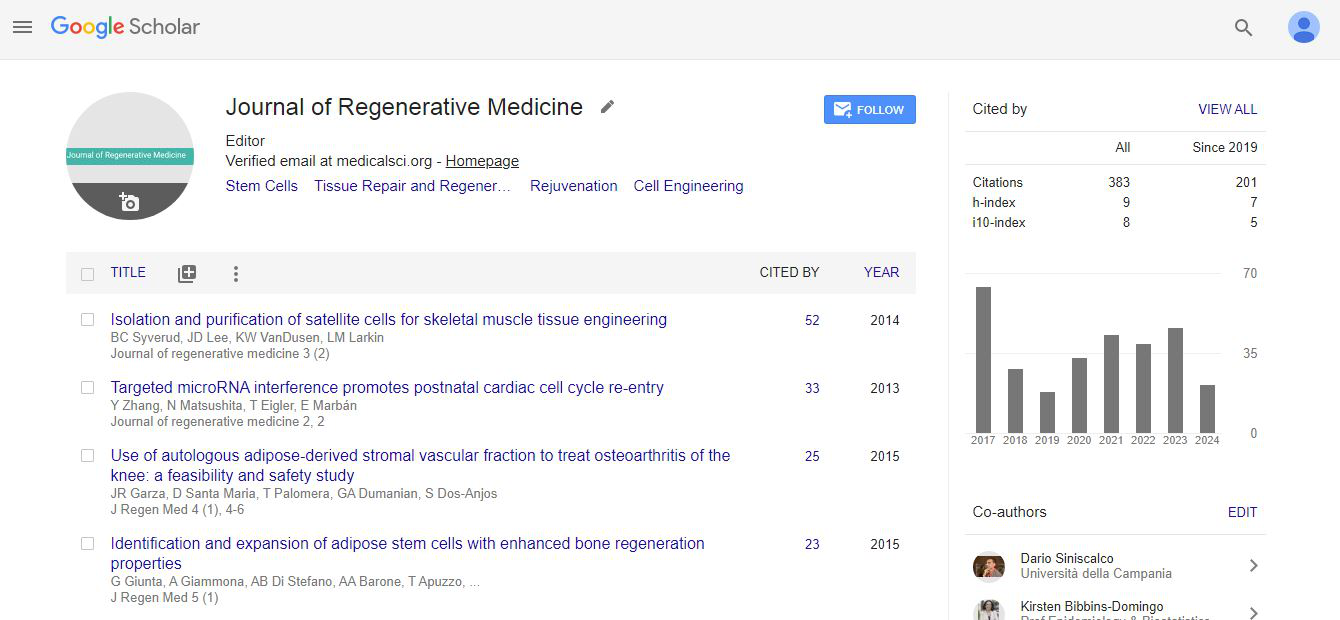New insights on the potential role of mesenchymal stem cells in rescuing degenerated cholinergic neurons
Hadeer A Aglan, Hanaa H Ahmed, Ehab Ragaa and Laila A Rashed
National Research Centre, Egypt Cairo University, Egypt
: J Regen Med
Abstract
Background: Transplantation of mesenchymal stem cells (MSCs) for treating neurodegenerative disorders has received growing attention recently because these cells are readily available, easily expanded in culture, and when transplanted survive for relatively long periods of time. Objective: The current study was planned to explore the possible role of single intravenous dose of MSCs in mitigation of degenerated cholinergic neurons in experimental model after 2 months. Materials & Methods: MSCs were harvested from bone marrow of femoral bones (BM-MSCs) and excised from adipose tissues of both the omentum and the inguinal fat pad (ADMSCs) of male Sprague-Dawley rats, grown and propagated in culture, then characterized morphologically and by the detection of cell surface markers gene expression. Also, their tripotential mesodermal differentiation capability into osteoblasts, chondrocytes, and adipocytes was confirmed. Regarding the biological experimentation: forty female rats were classified into 5 groups; Group (1) was control, while the groups from (2) to (5) were orally administered with AlCl3 for induction of cholinergic neurons deterioration. Group (2) was left untreated; groups (3), (4) and (5) were treated with cerebrolysin, BM-MSCs and ADMSCs respectively. Y-chromosome gene (SRY) was assessed by PCR in brain tissue of the female rats. Serum TGF-β1, MCP-1 and BDNF levels were assayed by ELISA technique. Brain ChAT expression was determined by immunohistochemical procedure. While, brain nestin gene expression was detected by sqRT-PCR. Also, histopathological investigation of brain tissues was done. Results: The data of the current work implied that BM-MSCs and ADMSCs were able to home at the injured brains and produced insignificant decrease in serum TGF-β1 and MCP-1 levels associated with significant increase in serum BDNF and nestin gene expression levels. Also, they caused significant increase in the number of positive cells for brain ChAT expression and ameliorate the neurodegenerative alterations in the hippocampus. Conclusion: These findings shed light on the promising role of BM-MSCs and ADMSCs in alleviating the retrogression of cholinergic neurons through their anti-inflammatory effect, neurotrophic capacity and neurogenic potential.
Biography
Hadeer A Aglan has completed her PhD from Faculty of Science, Ain Shams University, Egypt. She is Researcher at Hormones Department, Medical Research Division, National Research Centre, one of the biggest research centers in Egypt. She has published 4 papers in reputed journals and participated in 4 scientific projects. E-mail: ha_dero@yahoo.com
 Spanish
Spanish  Chinese
Chinese  Russian
Russian  German
German  French
French  Japanese
Japanese  Portuguese
Portuguese  Hindi
Hindi 